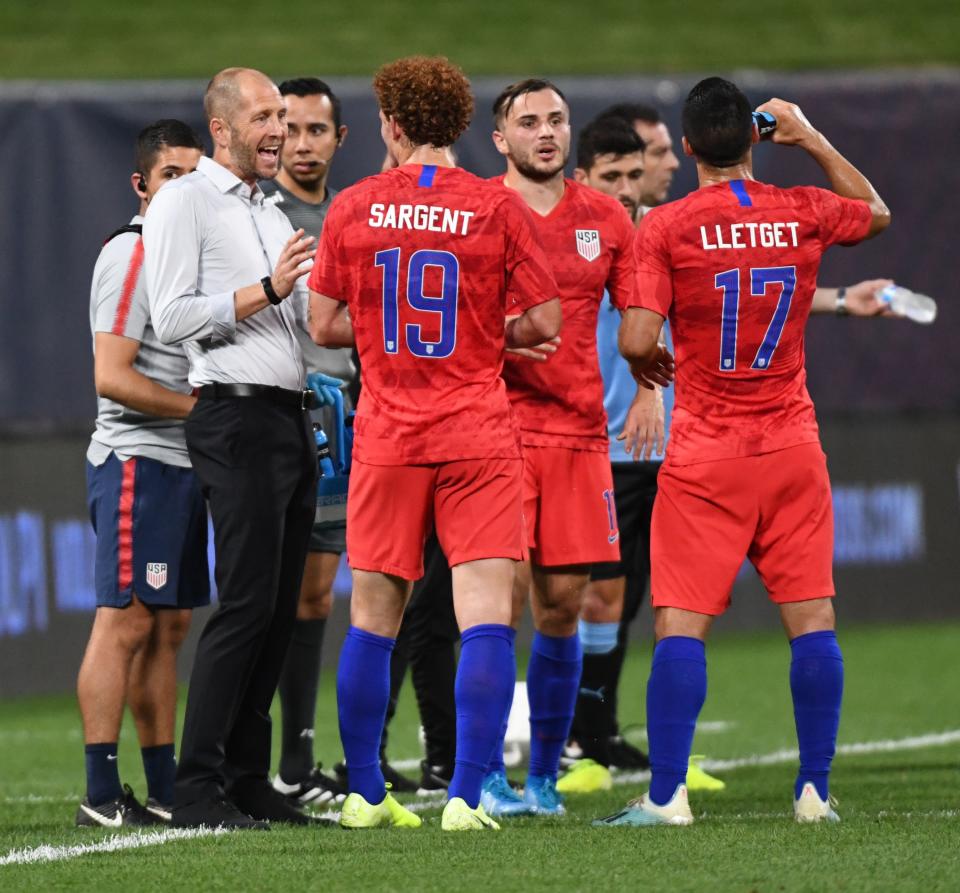How much patience should we have for Gregg Berhalter’s USMNT project?
How much patience is the right amount of patience?
Say what you will of Gregg Berhalter and his early tenure as United States men’s national team head coach, but he does what it says on the tin. He has come as advertised. He promised an evolved style of soccer, an ambitious thrust toward modernity for a program that has struggled to find its place in a soccer era that raced past the playing style that served America so well.
At some point, the program became self-conscious about absorbing and countering against the world’s more technical teams – which is most of them. Notions of progress were rooted in the belief that the national team had to be something it wasn’t. Quicker. Prettier. Possession-ier.
Jurgen Klinsmann didn’t deliver it. Bruce Arena was just trying to bail out a sinking ship. And now here comes Berhalter, an understated coach who punched far above his weight in the maelstrom of the Columbus Crew’s ownership chaos while playing attractive soccer. Here he is, charged with manifesting a future in which the old Stars and Stripes can compete in knockout games at the World Cup – or even go to World Cups.
His arrival coincided with that of a generation that is both golden and quite raw. Only Christian Pulisic is something resembling the finished product – days before his 21st birthday – primarily because he seems to have been born that way, emerging from the womb with an instinctive sense of movement and spacing. He was the national team’s best player more or less from the day he arrived.

But the trouble with starting pretty much from scratch, after a team that had grown old and stale missed the World Cup, is that time to figure things out is scarce, with camps coming only every month or two. It didn’t help that it took more than a year for the federation to finally get around to hiring a full-time coach, lurching ahead under interim coach Dave Sarachan. He did his best to introduce new, young players, but couldn’t map out the future either.
Consequently, the results have been mixed in Berhalter’s first calendar year in charge. And plenty of times, the performance looked worse than the scoreboard reflected.
A few friendly wins were followed by unsettling losses to Jamaica and Venezuela. The Americans did what they had to at the Gold Cup, reaching the final before losing to Mexico 1-0. And then, on Friday, they were hammered 3-0 by El Tri in New Jersey, badly beaten in every way.
A Tuesday bout with Uruguay followed. The Americans actually had the better of the chances but went behind when Uruguay carved the Yanks open on a counter-attack, finished by a smash by Brian Rodriguez. The U.S. pulled a 1-1 tie out of the fire when Jordan Morris chested the ball into the net after it had twice taken odd bounces.
It was hard to know what to make of it. The U.S. had sent Pulisic and several other key players home ahead of the game. Uruguay was without household name forwards Luis Suarez and Edinson Cavani, not to mention captain Diego Godin. Still, it had players employed by some of the world’s biggest clubs, although none in a starring role, exactly.
For the Americans, the soccer was improved and the result more palatable. But Uruguay also showed no real interest in putting them under pressure, happily waiting around for the U.S. to make a mistake in a vulnerable spot.
Which is all to say that we don’t entirely know where this team stands under Berhalter. His key players have shuttled in and out, negotiating the twin demands of involvement with a rebuilding national team and tending to their nascent club careers. Meanwhile, the question lingers whether Berhalter actually has the players that he needs to pull off a more attractive brand of soccer – an un-American kind of soccer. He insists that he does. Many commentators aren’t so sure.
[ Follow Yahoo Soccer on Twitter and Facebook ]
Berhalter has responded testily when his team’s shaky performances, to put it generously, have been called out. But to his credit, he has stuck to his guns. Even when a lopsided loss to the archrivals from south of the border loomed, he refused to close up shop and go into damage-control mode. His team kept playing out of the back, kept trying to pass its way through Mexico’s lines, no matter how many ugly turnovers ensued. His belief in his methods seems absolute.
This leads us to the larger discussion over just how much time Berhalter’s project should be given, how much leeway there is for those methods. He appears to have buy-in from his players. But then they might be poor judges of their own potential. The truth of the matter is that this program has embarked on a journey toward self-betterment several times before and never really seen it through. Berhalter seems insistent on sticking with it.
So what kind of deadline should we put on visible improvement, on a team taking shape that is worthy of a program that had grown accustomed to reaching the knockout stages at the World Cup?
Well, qualifiers begin in just under a year.
Leander Schaerlaeckens is a Yahoo Sports soccer columnist and a sports communication lecturer at Marist College. Follow him on Twitter @LeanderAlphabet.
More from Yahoo Sports:


